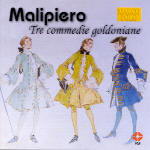Two things prevent Malipiero’s music from getting the attention that it deserves: He was a major fascist collaborator during the Second World War, and his huge output makes selection difficult. Of course, everyone says that his output is “uneven”, a judgment I find especially fascinating since it invariably comes from people who have had no opportunity to hear the vast majority of it. As with other prolific composers from Vivaldi and Haydn to Villa Lobos and Martinu, the reality will probably turn out to be that there’s more good music than bad, and that once his style is better understood, the failures will seem fewer and of less importance.
This disc offers four fine compositions that no one looking for expertly crafted, conservatively tonal, and/or neo-classical 20th century music will fail to enjoy. Malipiero actually started the “neo-classical update” school of Italian composition best represented today by Respighi’s Ancient Airs and Dances and La Boutique Fantasque. The idea here is to take some earlier music, in this case that of Cimarosa and Gabrielli, and give it an orchestral update, adding a few modern touches of rhythm and harmony where necessary. Malipiero does this sort of thing as well as anyone, and the results are delightful. His Symphonic Fragments from Three Goldoni Comedies offer good tunes and brilliant orchestration, whetting one’s appetite for the complete operas. The only problem with these three movements is that, as the title implies, they are fragments, and stop without warning. Better to leave the listener wanting more…
Stradivario, like Ravel’s La Valse, is a ballet that works just as well as a symphonic poem. The plot is fun: an antique instrument dealer steals a violin from an old beggar. That night, all of the instruments in his shop come alive, and when he awakes they take their revenge and crush him to death. The music is both characterful and graphic, and if Malipiero can write successfully in all of these different media, there’s no telling what other treasures lie out there awaiting performance. Christian Benda’s conducting does the music proud, and his orchestra sounds completely at home. Good sound too.
































